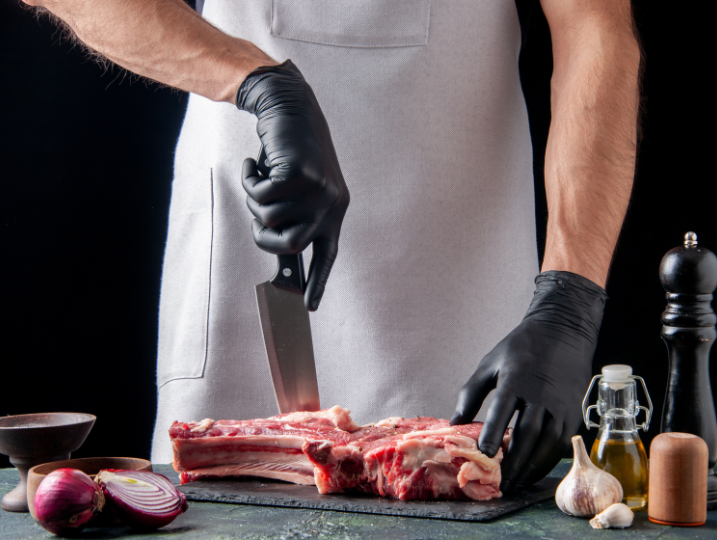Are Humans Designed to Eat Meat?

Author : Amal Rahiman
Are we really? There is a lot of research out there that supports both sides of theargument, so how about we look at each piece of evidence provided and make adecision for ourselves.
We all have our personal choices for our diet, but is eating meat simply an individual choice, or does the humanbody need it for its survival? Is our body equipped for eating and digesting meat?
In simple words, no.
What Does Evolution Prove?
The amount of conflicting research on this topic is mind-blowing, so let’s focus onlogic and evidence.
Hunter-gatherers are people who are entrusted with the task of foraging for food, intribes. They can be found in areas of the Amazon Rainforest, in Australia, and inAfrica. They go out to hunt for meat with the use of their hunting tools. Even withtheir tools, they fail in their hunting expeditions and come back empty-handed.
Now imagine our ancestors, all the way back then, without these tools to help themhunt. Paleoanthropologist Alison Brooks had suggested this conclusion, that theyfailed to get meat most of the time, and thus depended on the plants, tubers, andnuts that could be foraged.
Paleobiologist Amanda Henry also agrees that although the common belief is thathunting and eating meat made us human, it is far from the truth. People wantedmeat, but they couldn’t live off meat as it was difficult to get – unlike now where it isreadily available in our grocery stores. Due to this fact, people mostly lived off grains,tubers, fruits, and nuts.Analysing fossil teeth, and the tools used by early mankindalso suggests the same.
Keeping evolution aside, let’s have a look at our instincts as well. Humans act oninstincts, and what we are taught to do. We are not aware of what our food choicesare until we are taught to eat at a very young age. You grow up eating your family’sfood, and that is what you know as food. For instance, let’s say your family does noteat red meat, then that is what you would be used to. You would not be introduced tored meat, you would not have it in your diet for a very long time (until you decide tostart eating red meat out of your own choice), but yet you would still be a healthyhuman being.
So, is meat really that important, or are we simply taught to believe so?
What Do Our Instincts Tell Us?
Say you are out for a walk in the park. On the way, you see a dead bird. No violenceis involved, it is simply dead and on the floor. Is your first instinct that of hunger? Doyou crave to eat the bird?
No.
We are not carnivores, so we cannot compare ourselves to other carnivores likelions, instead compare ourselves to omnivores like dogs or cats. Their instinct wouldbe to go and have a lick of the dead bird. Their body craves meat, thatfeeling is intrinsic. But it is not the same for us.
Dead, unhygienic meat, rotten meat, or even raw meat does not tempt human beingsat all. In fact, it does the straight opposite. We are human, and thus the sight of bloodand flesh tend to disgust us, rather than make us hungry. Unless the meat is fullycooked and drenched in spices, sauces, and other seasonings, it does not seemappetizing. While most veggies, fruits, and nuts can be consumed raw, meat must always be tampered with before it can be consumed.
So, are we still designed to eat meat?
” But We Have Canines!”
Yes, we do! But so do chimps and gorillas, and they are mostly vegetarian (the little meat that they eat is of insects and not whole animals). That does not make them carnivores, they just have canines.
Our canines are not sharp, they are blunt and comparatively shorter than those of actual carnivores (like lions). Our canines cannot cut through animal hide, or chew through raw muscle meat. We must thoroughly cook them to be safe enough to digest. Natural meat eaters like our friendly lions do not have that problem. They hunt, they bite, they kill, they eat. They don’t need fancy cookware or wood fire to make food safe for them. Their stomach acids are concentrated enough to kill any bacteria that are present in dead decaying flesh.
If we humans simply eat an absolutely clean, but completely uncooked piece of meat, we would need emergency care, anti-biotics, and a whole week of solely plant-based foods.
This brings us to our last and final argument. When we get a bout of food poisoning,
we are forced to eat a plant-based diet for our recovery. Animal products, includingdairy, are not recommended, as our immune system is not strong enough to fight offthe regular bacteria present in these foods.
Now, what does that tell you?
We don’t like blood, we don’t have carnivorous teeth, we need external seasonings andresources to safely consume meat, our digestive system doesn’t like meat and we fall back on a plant-based diet to recover from meat-based illnesses.
So how are we still designed to eat meat?
Disclaimer: The content provided in this article is provided for information purposes only and is not a substitute for professional advice and consultation, including professional medical advice and consultation; it is provided with the understanding that Herbivo Pvt. Ltd. is not engaged in the provision or rendering of medical advice or services. The opinions and content included in the article are the views of the author only, and Herbivo does not endorse or recommend any such content or information, or any product or service mentioned in the article. You understand and agree that Herbivo shall not be liable for any claim, loss, or damage arising out of the use of, or reliance upon any content or information in the article.




